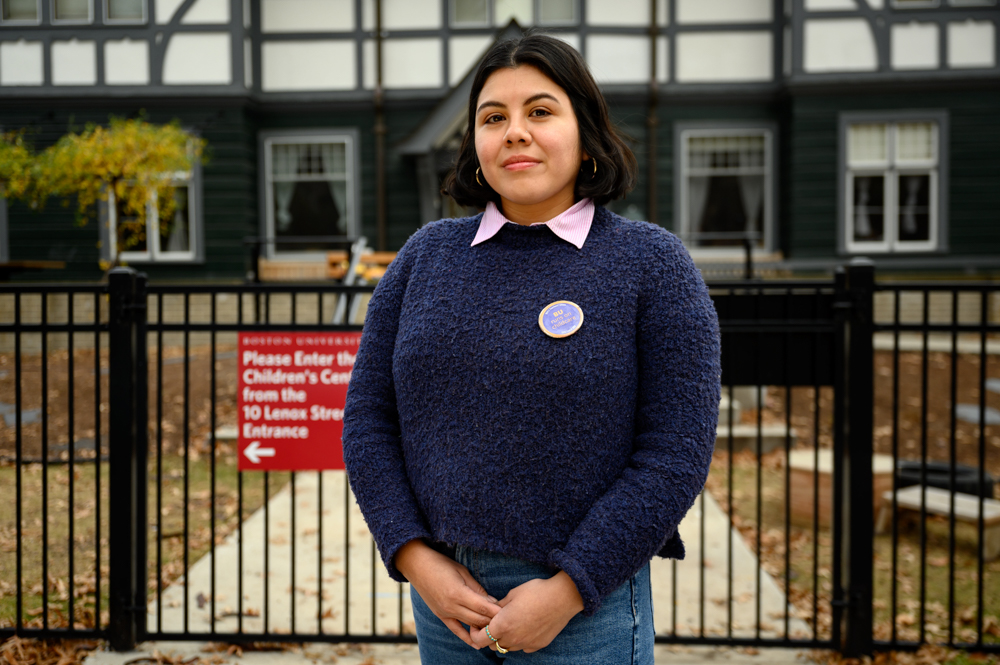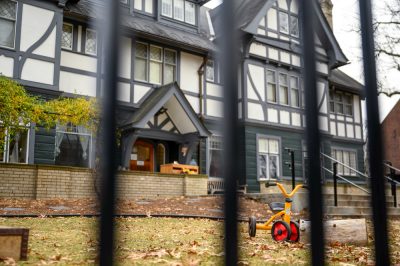The Boston University Children’s Center found a new home at 10 Lenox St. during the summer of 2020. So did Jessica Carangui.
Fresh out of the University of Connecticut, Carangui took the risk and the job for the great benefits the Center offered.
The new space tripled the Center’s capacity, allowing for care for infants. Carangui, now a lead preschool teacher at the Center, said the new space is beautiful, but some logistics of the building “just do not make sense.”

“You can tell even from the structure of the building that they didn’t collaborate with teachers,” Carangui said.
That was not Carangui’s — and her fellow teachers’ — only difficulty with the job. “Understaffing, low pay and achieving a voice on the job” led to the BUCC teachers unionizing, according to a press release from the Service Employees International Union Local 888 sent out in August 2022.
Founded in 1978, the BUCC is an early childhood education program that serves the children of BU staff, faculty and graduate students, according to its website. It has operated out of a historic home in Brookline since 2020, where teams of teachers work with infants, toddlers and preschool-aged students.
Wheeler DeAngelis, an infant-toddler mentor teacher at the BUCC, said a driving force in the unionization was the realization that other childcare centers operated by universities around Boston were paying their teachers a lot more.
“We found out that one of our college students who we had trained at the Center got a job working at one of the Harvard [childcare] centers and that she was making twice as much as the teacher who trained her,” DeAngelis said.
The trainer at BUCC was making $40,000, while the trainee was making $60,000 as a new college graduate, he said.
A year after unionizing, the teachers from the BUCC are still bargaining with the University for a contract, according to Judi Burgess, executive director of employee and labor relations at BU, and BU spokesperson Colin Riley.
Burgess and Riley declined to comment further, because BU does not comment on labor matters.
When the teachers first unionized, DeAngelis said BU was quiet. The union did not hear from BU until they seconded their petition for voluntary recognition. The University then raised their salaries within the next few weeks.
The raises varied person to person, DeAngelis said, with no transparency as to how those different amounts were calculated.
Low pay
All BUCC teachers interviewed for this story are a part of BUCC teacher union bargaining committee, except for DeAngelis, who quit the bargaining committee eight months ago, after his daughter was born.
The price point of the BUCC’s services makes it inaccessible to much of the community, said Carangui. All tuition to BUCC is paid through University Payroll Reduction, according to their website. For the 2023-24 academic year, tuition per month was $2,770 per infant, $2,500 per toddler and $2,030 per preschool student.
Debra Noe, a lead preschool teacher at BUCC, said there is a standard in the field of early childhood education at centers like the BUCC that ensures staff are able to send their own children at a significant discount. However, with the current salaries and tuition, “people would be paying well over half of their salary” to send their children to the center, she said.
“My daughter … actually attends the BUCC and for the last two months, my last four paychecks have been zero dollars,” DeAngelis said.
The union also aims to address teachers’ salaries. Myra O’Neal, a lead infant-toddler teacher — who started working at the center four years ago — said teachers are leaving the profession due to the lack of stability the salaries provide.
“It’s not just they’re leaving to work somewhere else,” O’Neal said. “They’re leaving early childhood because it’s not sustainable anymore. They can’t afford to live this way, economically and physically.”
According to a 2022 Bureau of Labor Statistics report, childcare workers earned $13.71 an hour, or $28,520 a year.

Understaffing
Beyond seeking greater recognition from the BUCC administration, teachers said the Center has experienced staff fluctuations since the onset of the pandemic.
“Throughout the pandemic, early childhood educators across the country have been on the frontlines doing the essential work of caring for infants and young children,” according to the SEIU press release. “They have gone above and beyond while remaining underappreciated, understaffed, and underpaid.”
Within the past three years, Carangui said the number of teachers lacked consistency while the amount of children in each classroom continued to grow to maximum capacity.
The BUCC just meets the minimum student-to-teacher ratios set by the state, according to DeAngelis. For children between the ages of 33 months and 7 years old, this ratio is 10 students per teacher, while the ratio for infants is 3-to-1, according to the Massachusetts Department of Early Education and Care.
“How can we be a top tier [child care center] if we’re just scraping the bottom of the barrel in covering these classrooms?” O’Neal said.
Understaffing has led to a decrease in preparation time for teachers, which is a necessity for a high-quality curriculum, according to Noe. She said that while BUCC teachers wish to stay at the top of their field and go beyond just meeting requirements, high staff turnover rates make this difficult.
“We need stability,” Noe said. “If a child isn’t able to have the same teacher all year because of turnover because of the conditions, that negatively impacts the child’s home life and the faculty.”
Noe said the Center’s high turnover rate may be a result of empty promises made to employees.
“If you attract top talent because you promised top conditions and then that doesn’t materialize, they leave and the conditions worsen,” Noe said.
Noe said this “vicious cycle” has negatively impacted some teachers’ wellbeing. Carangui added that the number of teachers leaving BUCC due to emotional distress was “too many to count.”
“It’s very challenging to be able to take time off knowing that we are so tight with staffing, so that also dips into work-life balance or mental health,” Carangui said.
As a way to help the other teachers and provide teaching experience, BUCC hires students from BU to act as student teachers.
Student teacher Sydney Butler, a senior in the Sargent College of Health and Rehabilitation Sciences described the understaffing as stressful because the BUCC is already meeting minimum ratios which makes it hard for teachers to step out of the classroom outside of their designated breaks.
In addition to student teachers, the BUCC also has float teachers, who are not assigned to any classroom but are available to work in any classroom in the center, according to Butler.
Dince Bunda, a float teacher for the BUCC who was also a former student teacher for the Center, said that sometimes, even the director of the Center has to step in and help out on days when the center was not fully staffed or needed support.

Voice
According to the teachers, achieving a voice on the job is imperative in order to collaborate with the Children’s Center administration.
“We’re really just trying to collaborate and really give them a better understanding of why we do what we do,” Carangui said.
Nicole Davis, a lead preschool teacher, said that before the unionization, bringing up issues was difficult because she did not want to feel like a “lone voice with a lone experience.”
Following the unionization, BUCC teachers have spoken about a renewed sense of solidarity.
“We’re refreshed and are supportive of one another in a new, deeper way,” Noe said. “We were always there for each other, but now we’re part of a larger movement.”
Teachers are not only focusing on their youngest students, but also on their student teachers. Carangui became emotional when discussing how the teachers try to give student teachers “an amazing experience” working at BUCC.
“Part of our job is to be helping [student staff] develop and to want to stay in work in these fields and contribute because it’s such an important social good,” Noe said.
Bunda said she is driven every day because of the relationships she has with her students and the other teachers she works with. She loves watching the children grow — “taking one step, two steps and even [when] they can start to walk.”
“I was out last week because I was sick,” Bunda said. “When I was home, I was like, ‘I’d rather be better and then go back to work because I miss my students.’”
This passion for their students’ growth is at the union’s core. While O’Neal said unions in early childhood education are uncommon, she hopes their fight brings attention to how “this work matters.”
“We give our heart, our mind, our body, our souls to these children,” she said. “That speaks for itself, that I would give so much of my life to someone else’s child.”
A previous version of this article contained a source saying that students were left alone with children. We have since changed this to reflect what the source meant to say.






















































































































